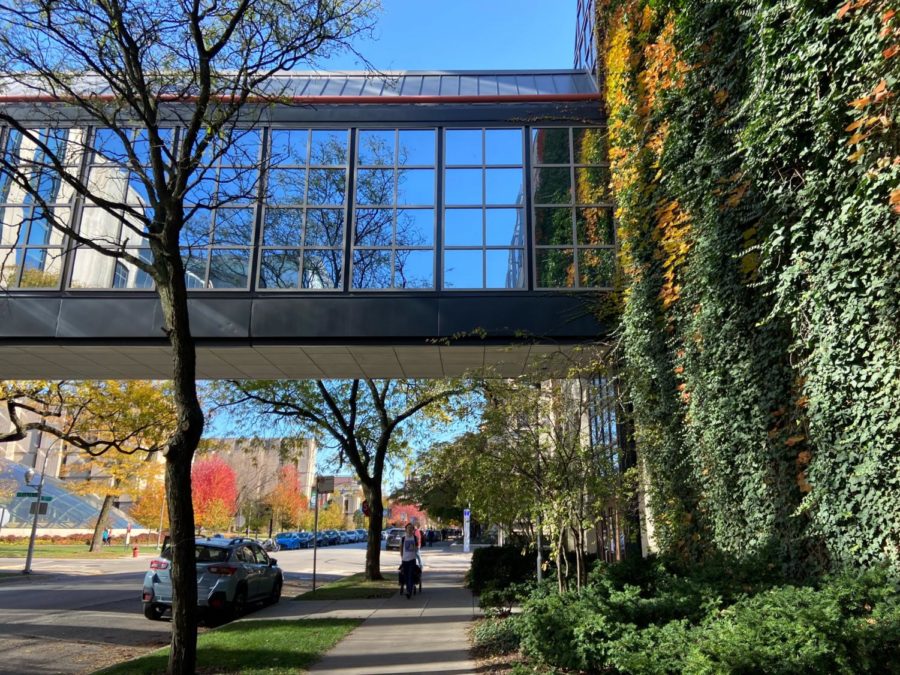In fall 2023, UChicago is launching a new master’s program, a Master of Science (M.S.) in Biomedical Sciences. The novel one-year program, created by the Biological Sciences Division (BSD) in partnership with the Pritzker School of Medicine, offers a curriculum focused on addressing modern biomedical challenges.
The new master’s program—which offers concentrations in science communication, biomedical data science, and health systems science—joins three existing master’s programs in the UChicago Biological Sciences Division (BSD): Master of Public Health (MPH), Master of Science in Public Health Sciences for Clinical Professionals (MSCP), and Master of Science in Precision Health.
The decision to establish a new master’s program reflects the growing popularity of one-year programs. “In this environment—this educational space that we’re in today—I think there is a growing demand for master’s-level training,” Director of Graduate Programs and Research Rebecca Plunkett said.
“[The idea was to help] those who got inspired by the pandemic but were not ready to commit to a four-year Doctor of Medicine (MD) degree or become a doctor,” Dr. Vineet Arora, dean of medical education and founding director of the Master of Science in Biomedical Sciences program, said.
All interviewees stressed that the program is not just future physicians or people with a background in medicine or healthcare. For that reason, it has a minimal number of prerequisite undergraduate science courses, only requiring one general course in both chemistry and biology.
“It’s designed to be open and welcoming and exploratory and challenging for a variety of people,” Sara Serritella, science communications faculty leader and director of communications for the Institute for Translational Medicine (ITM), said.
Dean of Master’s Education Dr. Samuel Volchenboum agreed, adding: “They can be students that are looking to pivot. They could, say, work for a pharmaceutical company and want to change career paths.”
The master’s program seeks to address the modern culture of misinformation, which was brought heavily into light during the COVID-19 pandemic. Fueled by the internet and social media, rumors swirled surrounding the efficacy of masks and vaccines.
“People trying to share positive information and fact-based information weren’t getting amplified as much,” Serritella said. To her, this emphasized the importance of training in science communications.
“You can be the best doctor or scientist in the world, but that can’t help people if it’s not being spoken in a way that people can be informed, engaged, and motivated to act,” Serritella said.
To develop the curriculum, the master’s education directors drew from various programs across UChicago, from the Pritzker School of Medicine to the College. This included adapting existing undergraduate science communications courses: Writing a Digital Science Story, Producing a Science Video Story, and Building a Science Exhibit (BIOS 28101–28103). Undergraduate students finished these courses with tangible work: published papers, professional quality videos, and science exhibits displayed in Chicago.
“This concentration itself really bridges two quite different areas: journalism and healthcare,” Samantha Fan, director of academic affairs, said, speaking about the master’s concentration in science communication.
Serritella and the other directors applied the same mindset of hands-on skills and rewards to the new classes in the Master’s of Science in Biomedical Sciences program. All students in the program complete a capstone assignment aligning with their interests, concentration, and prospective career.
In addition, curriculum directors adjusted existing popular programs in the Pritzker School of Medicine into classes for the master’s program. When the medical school was online due to the pandemic, students took an elective where they created infographics to dispel common medical myths, many of which were related to COVID-19. “It was a hit for medical students,” Arora said.
Another class they hope to adapt taught the skill of writing an op-ed surrounding a scientific topic. Arora explained that the course had originally been a pilot to determine if the course would be useful, but it ended up having wide-reaching consequences. “Every week I would open the Chicago Tribune and see another student’s op-ed about a really important issue,” Arora said.
The new program intends to create an environment for students to learn, rather than fear failure. “We really are proud to create a safe space where we’re always optimizing and celebrating even those learning moments,” Serritella said.
The inaugural class of the Master’s in Biomedical Sciences program will be composed of approximately 30 students, with options for expansion in the coming years. Volchenboum expressed a goal to increase the accessibility of the program through online courses. “It’ll open up the courses to folks that just can’t move to Chicago,” he said.
Serritella also said that the University hopes to ensure the program remains relevant as technology progresses. “[We have a] completely open, exploratory, innovative mindset to keep building based on what students need, and what we see the communications world looking like.”








